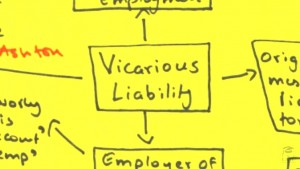In this blog post, Sreeraj K.V, a student of Government Law College, Ernakulam, Kerala writes about the effect of vicarious liability under Indian laws of contract. This post covers areas like the definition, elements of vicarious liability, major cases dealing the matter as well as certain exceptions to this term.
Introduction
Vicarious liability can be defined as such liabilities wherein a person will be held liable for an act done by someone else. In the field of tort, it is considered to be an exception to the general rule that a person will be liable for his own acts only. So that the liability of a person for the act of someone else may arise, it is necessary that there should be certain kind of relationship among both the persons and the wrongful act. This must be connected with their relationship.[1] 
Common examples of such liabilities are:
- Liability of the Principal for the tort of his agent
- Liability of partners for each other’s tort
- Liability of master for the tort of his servant
In a case of vicarious liability, both the person at whose behest the act is done as well as the person who does the act is liable. Thus, employers are vicariously liable for the torts of their employees that are committed during their employment.[2]
Reasons for Vicarious Liability
There are several reasons for a person to commit an act which results in vicarious liability:
- The wealth of a defendant or his access to financial resources and in some cases had an unconscious influence on the development of legal principles.
- Vicarious liability encourages prevention of an accident by giving an employer a financial interest in encouraging his employees to take care of the safety of others.
- As employers gain from any profit from his employees, he also bears any losses caused by them.[3]
Under the Indian Contract Act, there is no special provision regarding the term ‘vicarious liability’. But the Act defines certain terms such as ‘principal’, ‘agent’ as well as various provisions relating to the principal and agent as well as their duties and liabilities. Section 182 to 238 of the Act states such provisions. It also provides provision regarding nature of principal – agent relationship as well as extends the liabilities of both principal and agent.[4] The Act, under section 183, states that no person can be an agent unless he attains the age of majority and has a sound mind. In the words of Lord Chelmsford, “it has been established by law that a master is liable to third persons for any injury or damage done through the negligence or unskillfulness of a servant acting in his master’s employ. The reason is that every act done by the servant in the course of his duty is regarded as done by his master’s order, and, consequently it is the same as if it were master’s act”[5]. 
For example, A has a car Driver B. If he negligently knocks down X, then A will be liable. But if he hires a taxi towards railway station and the taxi driver negligently hits X, then A will not be liable towards X because the taxi driver is not the servant of A but an independent contractor. In every case involving vicarious liability, the doctrine of ‘Respondeat Superior’ (let the master answer) will be applicable. In every instance which leads to the situation of vicarious liability, the employer-employee or the principal-agent relationship will be the key factor. In such instances, the principle will be liable for the act done by his agent. There are three elements generally:
- Was the act committed within the time and space limit of the agency?
- Was the offense confidential, or of the same general nature as, the responsibilities the agent is authorized to perform?
- Was the agent motivated to any degree to benefit the principal by committing the act?[6]
In the Contract Act, it is up to the principal to prove whether the act committed by his agent does not come under the frame of their principal agent relationship and if he fails to prove so, he will be held liable for the act done by his agent under the head of vicarious liability. In India, there are various cases involving offenses done by the agent and the principal being liable for the same.
In the case of State of Rajasthan v. Smt Shekhu and ors[7], the deceased and his brother were going on a bicycle and a jeep which was owned by Distt. Collector came from the opposite side and hit them which resulted in the death of the deceased. In this case, the Court clearly stated that definition of ‘vicarious liability’ means that one person takes or supplies the place of another so far as the liability is concerned. It means the liability of a person for the tort of another in which he had no part. The court also stated that an owner of a car would be liable for an accident caused by his servant during the time of his employment. From this statement, it was made clear that in this case, the respondent was held liable. In many other cases such as K.K.Ahuja v. V.K.Vora and ors[8], the Supreme Court held that vicarious liability would apply to companies also as the case dealt with the liability of a deputy manager of a bank in the issue of a dishonored cheque.
Exceptions to the Liability
There are certain exceptions granted to the principal from the acts done by his servant which comes under vicarious liability which include:
- Act was done by the agent other than the one stated by the principal.
- Act was done by the agent which does not come under the agency norms between them.
- An act was done by the person before or after termination of the contract of agency.
Even though there are various other exceptions, these are the general exceptions levied under the provisions regarding vicarious liability in India.
Conclusion
The rule of vicarious liability can be clearly traced out from the famous doctrine of “qui facit per se per alium facit per se” which means he who does an act through another does the act himself. So a master will be held liable for the acts done by his employee even though he is unaware of the act. But someone who employs a contractor to work on behalf of that person is not responsible for any tort committed by the contractor in the course of execution of work except in certain exceptional cases. Formation of a principal-agent relationship is purely based on the trust which the principal has with his agent. Hence, the act leading to vicarious liability surely amounts to the infringement of that trust on the part of the agent. So agents are advised not to perform any such activities which result in an act which makes his principal liable. The principal, on the other hand, also needs to be very curious about the acts of his agent so that if he finds that the agent is not fit to continue his works, the principal can take several measures as to the termination of the agent from working under the principal. In companies, such immediate termination is not possible as there are certainly other issues regarding the appointment and termination of employees. In such instances, companies can adopt strict guidelines as to the code of conduct of the employees as well as their works so that they will be restricted from performing any acts which make the higher official liable.
[divider]
Footnotes:
[1] Retrieved on: http://www.legalservicesindia.com/article/article/vicarious-liability-in-india-1634-1.html
[2] Retrieved on: http://www.legalservicesindia.com/article/article/vicarious-liability-in-india-1634-1.html
[3] Retrieved on: http://www.legalservicesindia.com/article/article/vicarious-liability-in-india-1634-1.html
[4] Retrieved on: http://comtax.up.nic.in/Miscellaneous%20Act/the-indian-contract-act-1872.pdf
[5] Retrieved on http://www.legalservicesindia.com/article/article/vicarious-liability-in-india-1634-1.html
[6] Retrieved on: https://en.wikipedia.org/wiki/Respondeat_superior
[7] the State of Rajasthan v. Smt Shekhu and ors I (2005) ACC 156
Retrieved on: https://indiankanoon.org/doc/58441/
[8]K.K.Ahuja v. V.K.Vora and ors Criminal appeal no. 1130-31 of 2003
Retrieved on: http://www.lawyersclubindia.com/forum/SC-judgment-on-Vicarious-Liability-in-138-cases-10753.asp#.Vyhh7fl97IU
 Serato DJ Crack 2025Serato DJ PRO Crack
Serato DJ Crack 2025Serato DJ PRO Crack










 Allow notifications
Allow notifications


